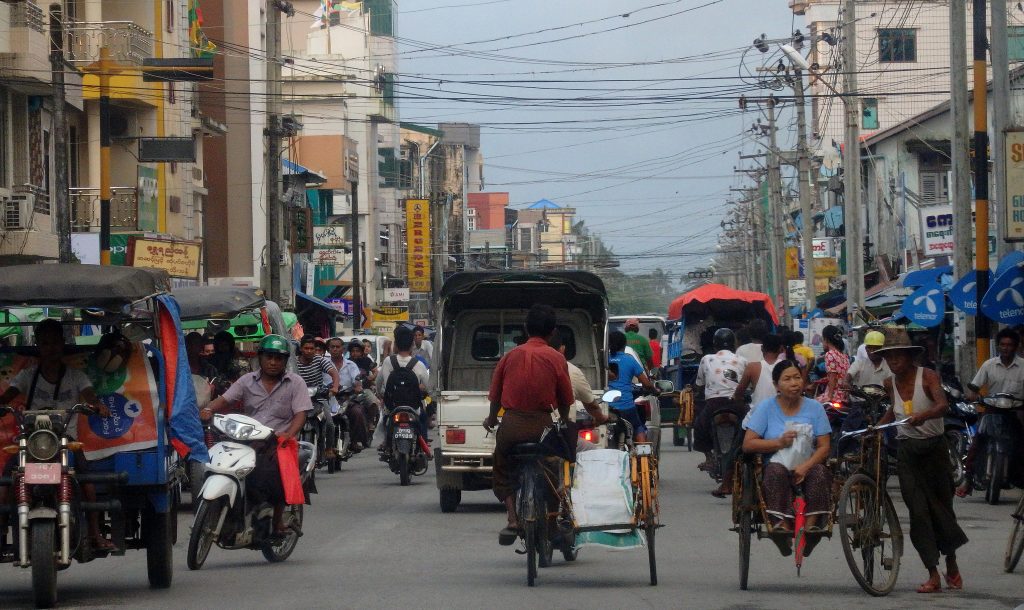A quest to share the benefits from natural resource extraction could put the Rakhine people on a path to better appreciating the full range of their human rights, Aung Myo Oo writes.
A 300-mile protest march (from Sittwe to Kyauk Phyu) demanding the sharing of revenue from natural resources began in Rakhine State on 21 November. Seven days later, on 27 November, they reached Kyauk Phyu, home of the controversial Shwe gas project, which siphons off tonnes of natural gas to China’s Yunan Province by transporting it across Myanmar’s heartland. They staged a mass protest at the heart of Kyauk Phyu, calling for restoration of their resource rights.
This protest march, initiated by a number of Rakhine political activists, is of considerable significance and can be seen as a positive move for the Rakhine community, although this news is not widely reported by the mainstream Burmese media. The march is a signal that the Rakhine people are demanding their rights.
Many Rakhine people have long had a problem with the concept of human rights, on the basis that they are a political tool for the ‘Bengali’ (the people the international community recognises as ‘Rohingya’).
In reality, many Rakhine people are not only deprived of their human rights, they are also not fully aware of what rights they are lacking. The Rakhine people, collectively, do not have control over their own natural resources. Article 1, paragraph 2 of the International Covenant on Economic, Social and Cultural Rights states that “all peoples may, for their own ends, freely dispose of their natural wealth and resources without prejudice to any obligations arising out of international economic co-operation, based upon the principle of mutual benefit, and international law. In no case may a people be deprived of its own means of subsistence.”
What the covenant sets forth is not at all realised in the daily lives of the Rakhine people. Even though the Rakhine people are granted basic human rights such as the right to nationality because they are recognised as bona fide citizens of Myanmar, in contrast to the Rohingya who are not, there are many more rights that the Rakhine people are entitled to enjoy and of which they should be made aware.
On the ground, most Rakhine people are unaware of international human rights laws, and so far no one has come forward to help them learn what is out there that might perhaps assist them to realise their rights in full.
Together with a colleague, who studied human rights at an international university, I have made a few grassroots attempts to educate the Rakhine people about human rights and the international human rights mechanisms that might be useful in their lives work. The responses were mixed. Some people started to think more positively towards human rights, while others remained staunch in their opposition.
The majority of Rakhine people receive their education from a government-sponsored system. As a result, many are very nationalistic and misinformed about a lot of things, from history to international relations, not to mention human rights. Many Rakhine people think human rights are restricted to the Universal Declaration of Human Rights.
But there is hope that there may be some young people wanting to learn – and unlearn – with regards to human rights. One young Rakhine man, who is studying at Oxford, posted the following on Facebook about the government’s denial of entry for journalists to the northern Rakhine State after their clearance operations.
“I think, as educated Rakhines, we can’t just sit back and act as if there weren’t anything happening. With the information blackout, and the government’s persistent denial of any wrongdoing and refusal to lift the information blackout, we’re in no position to verify what is happening on the ground with any certainty.”
This is a clear example that giving more information to Rakhine people would mean something for the advancement of human rights.
It would still be a long way to go before the Rakhine people would advocate for their ‘enemy’ but they need, at least, to stand up for their rights. The Rakhine people need to realise that human rights have something to offer them. The currrent march from Sittwe to Kyauk Phyu to demand their fair share of revenues from the sale of natural gas from their land is a first step in that direction.
Aung Myo Oo is a native of Sittwe and an active commentator on social media about political activities in Rakhine State. He received a Master of Human Rights and Democratisation from the University of Sydney.
 Facebook
Facebook  Twitter
Twitter  Soundcloud
Soundcloud  Youtube
Youtube  Rss
Rss 